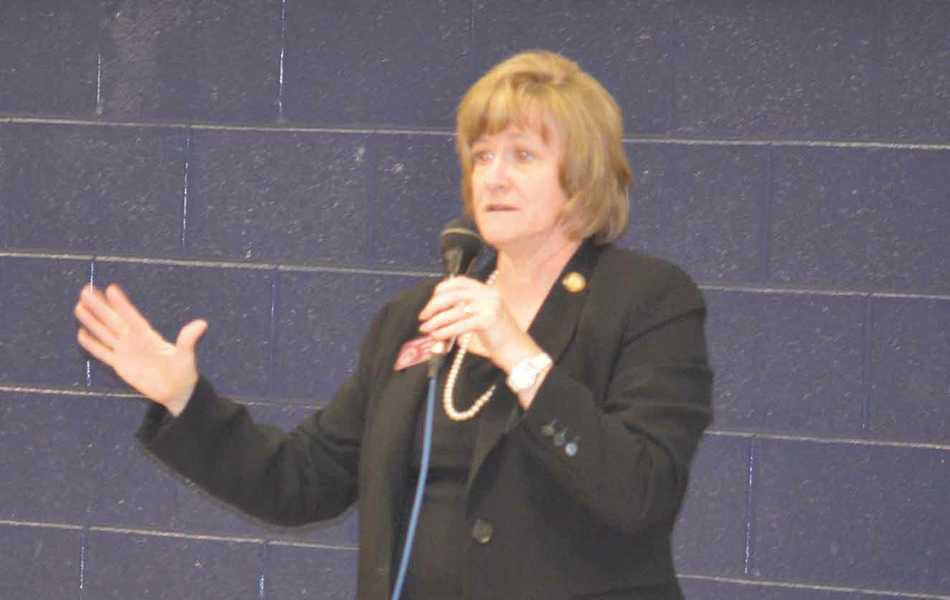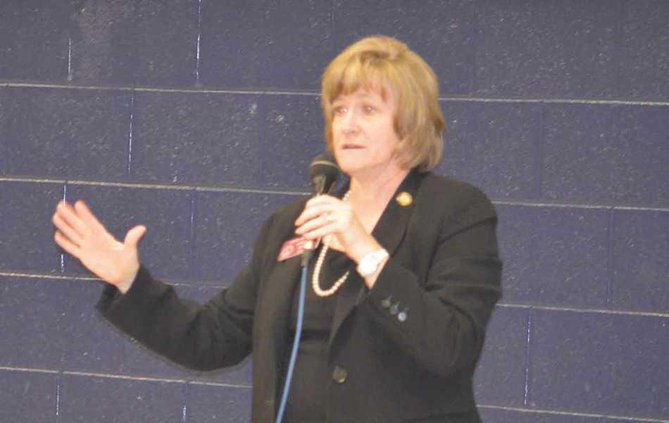WEST FORSYTH — Two Republican state lawmakers from Forsyth County heard from constituents during a town hall meeting Monday night, with the issues ranging from education to the makeup of local government.
District 24 state Rep. Sheri Gilligan, who began her first legislative session Monday, told the gathering at the West Forsyth High School gym that she was interested in serving the people.
“Education is a natural [issue] for me,” she said. “I’m one of those people who is very suspect of what’s going on with the federal government overreach into our school system. I want the teachers to be in control of the classroom, and I want the local board to have more say in what goes on.”
Gilligan won a special election over the summer to succeed longtime state Rep. Mark Hamilton, who resigned to pursue a business opportunity in Tennessee.
District 27 state Sen. Michael Williams also has his sights set on education, though the issue pertains to funding rather than curriculum.
“My No. 1 legislative agenda item for this session is to attempt to pass a constitutional amendment that would allow all counties [in Georgia], especially us up here in Forsyth County, to collect impact fees for education,” he said.
Impact fees are charges for new development that help cover the cost of increased demand on infrastructure, services and amenities.
Forsyth currently collects impact fees for parks, libraries and emergency services. Officials are considering adding a levy for roads, but impact fees cannot be collected for schools, per state law.
“It’s going to be an extremely difficult lift [at the Capitol], because … last session I tried to talk to some people about it and there was not much of an appetite for that in some of the rural parts of Georgia,” Williams said. “But we’ll see what we can do.”
The town hall meeting was the second in Forsyth County over a five-day span. Thursday night, District 25 state Rep. Mike Dudgeon of south Forsyth held a similar session at Lambert High School.
Nearly 20 people spoke during Monday night’s meeting. Tony Gulla said the wording of a straw poll in 2008 on how best to elect the county commission, Forsyth’s governing body, was confusing. He wants to revert to countywide voting for the five-member panel.
“That gave us what we have today, which is voting on commissioners based on district,” Gulla said. “So if you don’t like what’s going on in the north part of the county or the southern part of the county as far as growth, too bad. You can only vote for your commissioner.”
Williams wasn’t sure a return to countywide voting would be possible, citing potential representation issues with the Civil Rights Act of 1964.
The movements for the proposed cities of Bethelview, in west Forsyth, and Sharon Springs, in south Forsyth, also were brought up.
Beth Tipton, founder of the Bethelview Alliance, said the work of her group would continue.
“We citizens in the west Forsyth area, like those in the Sharon Springs area, were very concerned about the unbridled growth in our area,” she said. “I don’t think any of us want to add another layer of government, however there is an air of desperation growing among homeowners. I think we are underestimated.”
Williams noted that the local state legislative delegation had recently pulled a bill that could have led to the formation of Sharon Springs over potential constitutional issues. However, he said, cities could come in another form.
“The possibility for a township or a village is a very real possibility.” Williams said. “There are forces at be that are trying to push through a constitutional amendment that would create towns and villages here in Georgia. If that happens, as soon as next year, we could move forward with another bill.”
Other speakers brought up issues of bills that would personally affect them, including teachers’ pay, restrictions on dental hygienists and the possibility of growing medical marijuana in Georgia.

